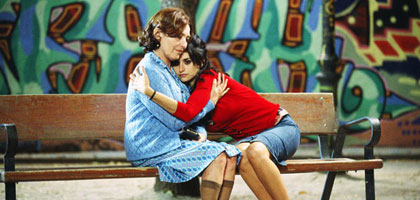Primary navigation


Critics - including Sight & Sound's - and fans alike seem bewitched by the so-called Almodóvar effect, but, argues Peter Matthews, closer scrutiny of some of the Spaniard's recent films suggests a slick recycling of tired themes
Though it may seem churlish to knock a film-maker whose only crime has been a naked desire to please audiences, Volver really is one of Pedro Almodóvar's weaker efforts. The title derives from Estrella Morente's 1961 tango classic (which star Penélope Cruz tearfully lip-syncs during a party scene) and means 'to come back'. Storywise, the chief prodigal is the heroine Raimunda's mother, Irene, burned to a crisp in a mysterious fire and now disinterring a melodramatic slew of guilty secrets from the past as a suspiciously corporeal ghost. There's a further sentimental resonance in that the director's erstwhile muse Carmen Maura plays the ambiguous Irene (their last collaboration was the 1987 movie Women on the Verge of a Nervous Breakdown), and what with Hollywood babe Cruz revisiting her prelapsarian roots and the fleeting appearance of a third Almodóvar alumnus, the granite-faced Chus Lampreave, Volver has the convivial aspect of a family reunion.
All of which is probably enough to satisfy the legion of Almodóvarites, though cynics might argue that a better name for the film would be 'Déjà Vu'. One can't escape the impression that this adept in effervescent postmodern whimsy is coasting on the goodwill he's built up with viewers over 20 years and hoping they won't notice how some of the bubbles have gone flat.
Chances are they won't, and that's because of a phenomenon so striking it deserves to be called the Almodóvar effect. The Soviet film-maker and theorist Lev Kuleshov once demonstrated that spectators automatically infer a connection between widely disparate shots through the power of editing. Almodóvar's version of this magic is to open his usual candy box of attractions - the rich, saturated colours, the glossily hyperbolic production design, a plaintive ballad on the soundtrack, dippy but indomitable women, ornamental but feckless men - and wait for the prizes to roll in. Whether by auto-suggestion or bewitchment, critics and fans disregard the evidence before their eyes and watch the archetypal Almodóvar movie playing in their heads. At least that's one way to explain the reception of so lazily recycled an enterprise as Volver, ritually declared another masterpiece and its large female cast scooping a joint best-actress trophy at Cannes.
It's not as if the picture isn't well made. Back in the days of Dark Habits (1983) and Matador (1986), when the director first struck a nerve as the 'bad boy' of Spanish cinema, his staging was erratic, often barely competent. Still, one could enjoy the shambolic formlessness of Almodóvar's early films, since it went with their gleefully tacky comic-strip humour, and both qualities seemed to give the finger to the enforced rigours and pieties of the Franco era.
But the tenure of the enfant terrible is brief, and after peddling campy outrage with diminishing returns for more than a decade, Almodóvar needed to move on. Around the time of The Flower of My Secret (1995) and Live Flesh (1997), he began to exhibit signs of technical discipline, and now few can touch him for smooth, velvety craftsmanship. That isn't entirely a recommendation. When late in life, his compatriot Luis Buñuel developed a serene style to express the new charm he found in the bourgeoisie, it was the mask for an unrepentant anarchist's fury. If only that were the case with Almodóvar, but he's more like another failed iconoclast, François Truffaut, who excoriated the proficient, bloodless cinéma de papa in his youth only to become a paid-up member of it in middle age.
Even at his most obstreperous, Almodóvar was always perhaps too warmly irresistible to be a true rebel. Godard with a human face, Pauline Kael famously dubbed him, which was apt given that he followed roughly the same method of quick-witted pop allusiveness as the French director but turned it to the less radical goal of cocking a snook. Though Almodóvar's 'mature' work is more deliberately paced and has an intermittent air of rueful gravitas, neither should be mistaken for depth. Recent films such as All about My Mother (1999) and Talk to Her (2002) drop off the conveyor belt like a string of gourmet sausages. Audiences who want juicy, overstuffed entertainment that doesn't fundamentally challenge them can count on Almodóvar for heartfelt lessons in gender politics spiced with nostalgic fillips of obscenity.
Volver includes a brace of fart jokes, pointing up the moral that women are happier with their bodily functions than men. It's a tenuous proposition, but not unexpected from a director whose acclaim greatly depends on his penchant for sisterly idealisation. When women say Almodóvar understands them more intimately than any other male artist, they mean he flatters their self-esteem. We all know what majestic creatures his women are - capricious, dreamy, hysterical, shifting moods with the breeze, but endlessly, toweringly strong.
As if to certify this female quixotry, Almodóvar sets Volver in his native La Mancha, where the constant, raging winds allegedly drive women to lunacy, suicide and murder. The pathetic fallacy vaguely refers to hormonal cycles (and no doubt the joyous flatulence forms part of the same aeolian motif). But to balance the tempestuousness and show how women basically have two feet planted on the ground, there's also much attentive, bustling preparation of food. Potatoes are peeled, tomatoes chopped, soups ladled and jams preserved in a blaze of rainbow hues that puts one in mind less of Chantal Akerman's 1975 film Jeanne Dielman… than of 'good living' magazines available free at the supermarket. Just for washing the dishes, Cruz's Raimunda is exalted as a domestic goddess - Almodóvar's camera taking a bird's-eye view of the sink that feasts on her ample cleavage. He doesn't neglect his heroine's spreading (false) derrière either, and one soon gets the idea that the distaff characters in Volver are bursting at the seams with the life principle. Capering around the village in skin-tight floral print dresses, Cruz is done up to evoke Sophia Loren in such rambunctious peasant comedies as The Gold of Naples. But the result isn't even 'pink' neorealism. It's closer to puce, which the dictionary defines as the colour of a squashed flea.
If the plot feels ridiculously trivial, that's due to the almost total absence of conflict. It's like breaking a taboo to say so, but, frankly, Almodóvar is subtler and more convincing when he reflects on men. In these rare phases (the 1987 film Law of Desire or 2004's Bad Education), he isn't blinded by excessive gallantry and can afford to be halfway honest about the strange, dark, contradictory animal staring at him in the mirror. With Volver, the looking-glass is so fetishised and idolatrous that it effectively repels drama.
Almodóvar frequently stops the movie dead to contemplate the women's proud, radiant faces, singly or in two- and three-shots that emphasise their mirthful feminine complicity. He fantasises a matrilineal utopia where women tirelessly cooperate in relieving misfortune and no resentment is sufficiently deep that it can't be settled by a neighbourly hug. Men are superfluous in this beatific vision - causing trouble, but swiftly dealt with (Raimunda's sponging husband, Paco), or relegated to the mists of the backstory (her unnamed, child-abusing father). Though Almodóvar claims Michael Curtiz's Mildred Pierce as an intertext, that's wishful thinking. Cruz is a powder-puff alongside Joan Crawford's cast-iron, hungry go-getter, whose fraught relationship with her acquisitive daughter carries a real burden of love and pain.
Raimunda's offspring, Paula, kills her randy stepfather (à la Mildred Pierce), but she's over the trauma in five minutes, and sits out the rest of the movie smiling wanly. Psychological credibility wasn't an issue in the Punch-and-Judy universe of Tie Me Up! Tie Me Down! (1989) or Kika (1993). Women were slapped around and gang-raped, but treated their tormentors as so many pesky flies to be languidly swatted. Now that Almodóvar is a proper bourgeois film-maker, however, one holds him to more exacting standards. His script for Volver resembles an old housecoat: comfortably familiar, if you like, but wearing thin from its numerous holes and loose threads, and faintly smelling of mothballs. Raimunda nobly offers to shoulder the blame for the patricide, and then doesn't; she launches a humming restaurant business (in tribute to the ambitious Mildred), but her entrepreneurial skills come to nothing; a tired episode involving terminally ill friend Agustina's participation in a reality TV show leads nowhere. Even the frisky conceit of amplifying the women's kisses so that they detonate like firecrackers in the sound mix isn't fully sustained. And can one believe for an instant that the film's four actresses - the heavily lacquered Cruz, Lola Dueñas as her mousy sister, Sole, Yohana Cobo as the insipid Paula, Maura as the ravaged but peppy matriarch, Irene - belong to a family? They're so randomly matched up that if Julia Roberts, Naomi Watts, Kirsten Dunst and Barbra Streisand were substituted it wouldn't make the slightest odds. The way Almodóvar is going, he'll soon be ready to helm the arthouse remake of Steel Magnolias.
Late in Volver, he quotes Luchino Visconti's 1951 film Bellissima, starring Anna Magnani - a tactical error if ever there was one. Almodóvar obviously wants to place his divas in the same embattled, heroic tradition; but a glimpse of Magnani in a black slip and simply brushing her hair is enough to blast these other women, likeable though they are, clear off the screen.